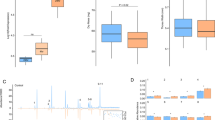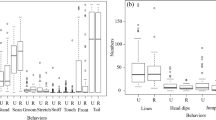Abstract
Cooperation during territorial defense allows social groups of African lions to defend access to resources necessary for individual reproductive success. Some forms of cooperation will be dependent upon cognition: reciprocity places greater cognitive demands on participants than does kinship or mutualism. Lions have well-developed cognitive abilities that enable individuals to recognize and interact with others in ways that seem to enhance their inclusive fitness. Male lions appear to cooperate unconditionally, consistently responding to roaring intruders regardless of their male companions’ kinship or behavior. Female lions, however, do keep track of the past behavior of their female companions, apparently using the reliability of a companion as one means of assessing the risks posed by approaching intruders. Some “laggard” females may exploit the cooperative tendencies of “leaders” during territorial encounters. Although leader females clearly recognize laggards as such, the costs of tolerating laggards may be less than the benefits leaders gain through territorial defense behavior. Thus, although lions clearly have the cognitive ability to base cooperation on reciprocity, territorial defense cooperation appears instead to be based primarily on mutual benefits to participants for both male and female lions.
Similar content being viewed by others
References
Axelrod, R., and W. D. Hamilton 1981 The Evolution of Cooperation. Science 211:1390–1396.
Barnard, C. J. 1984 When Cheats Prosper. In Producers and Scroungers, C. J. Barnard, ed. Pp. 6–32. London: Croom Helm.
Bygott, J. D., B. C. R. Bertram, and J. P. Hanby 1979 Male Lions in Large Coalitions Gain Reproductive Advantages. Nature (London) 282:839–841.
de Waal, F. B. M. 1982 Chimpanzee Politics. London: Jonathon Cape.
Dugatkin, L. A., M. Mesterton-Gibbons, and A. I. Houston 1992 Beyond the Prisoner’s Dilemma: Toward Models to Discriminate among Mechanisms of Cooperation in Nature. Trends in Ecology and Evolution 7:202–205.
Gilbert, D., C. Packer, A. E. Pusey, and S. J. O’Brien 1991 Analytical DNA Fingerprinting in Lions: Parentage, Genetic Diversity, and Kinship. Journal of Heredity 82:378–386.
Goodall, J. 1986 The Chimpanzees of Gombe. Cambridge, Massachusetts: Belknap.
Grinnell, J. 1994 Cooperation and Communication in Coalitions of Male Lions. Ph.D. dissertation, University of Minnesota.
Grinnell, J., and K. McComb 1996 Maternal Grouping as a Defense Against Potentially Infanticidal Males: Evidence from Field Playback Experiments on African Lions. Behavioral Ecology 7:55–59.
Grinnell, J., C. Packer, and A. E. Pusey 1995 Cooperation in Male Lions: Kinship, Reciprocity or Mutualism? Animal Behaviour 49:95–105.
Hamilton, W. D. 1964 The Genetical Evolution of Social Behaviour. Journal of Theoretical Biology 7:1–52.
Heinsohn, R. 1997 Group Territoriality in Two Populations of African Lions. Animal Behaviour 53:1143–1147.
Heinsohn, R., and C. Packer 1995 Complex Cooperative Strategies in Group-Territorial African Lions. Science 269:1260–1262.
Hemelrijk, C. K. 1996 Reciprocation in Apes: from Complex Cognition to Self-structuring. In Great Ape Societies, W. C. McGrew, L. F. Marchant, and T. Nishida, eds. Pp. 185–195. Cambridge: Cambridge University Press.
Jahn, G. C. 1996 Lioness Leadership. Science 271:1215.
Lima, S. L. 1989 Iterated Prisoner’s Dilemma: an Approach to Evolutionarily Stable Cooperation. American Naturalist 134:828–834.
Maynard Smith, J. 1983 Game Theory and the Evolution of Cooperation. In Evolution from Molecules to Men, D. S. Bendall, ed. Pp. 445–456. Cambridge: Cambridge University Press.
McComb, K. 1992 Playback as a Tool for Studying Contests Between Social Groups. In Playback and Studies of Animal Communication, P. K. McGregor, ed. Pp. 111–119. New York: Plenum Press.
McComb, K., C. Moss, S. Sayialel, and L. Baker 2000 Unusually Extensive Networks of Vocal Recognition in African Elephants (Loxodonta africana). Animal Behaviour 59:1103–1109.
McComb, K., C. Packer, and A. E. Pusey 1994 Roaring and Numerical Assessment in Contests between Groups of Female Lions, Panthera leo. Animal Behaviour 47:379–387.
McComb, K., C. Packer, A. E. Pusey, and J. Grinnell 1993 Female Lions Can Identify Potentially Infanticidal Males from Their Roars. Proceedings of the Royal Society, Series B 252:59–64.
Mesterton-Gibbons, M., and L. A. Dugatkin 1992 Cooperation among Unrelated Individuals: Evolutionary Factors. Quarterly Review of Biology 67:267–281.
Packer, C. 1986 The Ecology of Sociality in Felids. In Ecological Aspects of Social Evolution, D. I. Rubenstein and R. W. Wrangham, eds. Pp. 429–451. Princeton, New Jersey: Princeton University Press.
Packer, C., and R. Heinsohn 1996 Lioness Leadership (Reply). Science 271:1215–1216.
Packer, C., and A. E. Pusey 1983 Adaptations of Female Lions to Infanticide by Incoming Males. American Naturalist 121:716–728.
1985 Asymmetric Contests in Social Mammals: Respect, Manipulation, and Age-specific Aspects. In Evolution, P. J. Greenwood, P. H. Harvey, and M. Slatkin, eds. Pp. 173–186. Cambridge: Cambridge University Press.
Packer, C., D. A. Gilbert, A. E. Pusey, and S. J. O’Brien 1991 A Molecular Genetic Analysis of Kinship and Cooperation in African Lions. Nature (London) 351:562–565.
Packer, C., L. Herbst, A. E. Pusey, J. D. Bygott, J. P. Hanby, S. J. Cairns, and M. Borgerhoff-Mulder 1988 Reproductive Success of Lions. In Reproductive Success, T. H. Clutton-Brock, ed. Pp. 363–383. Chicago: University of Chicago Press.
Packer, C., D. Scheel, and A. E. Pusey 1990 Why Lions Form Groups: Food Is Not Enough. American Naturalist 136:1–19.
Pusey, A. E., and C. Packer 1987 The Evolution of Sex-biased Dispersal in Lions. Behaviour 101:275–310.
1994 Non-offspring Nursing in Social Carnivores: Minimizing the Costs. Behavioral Ecology 5:362–374.
Schaller, G. B. 1972 The Serengeti Lion. Chicago: University of Chicago Press.
Scheel, D., and C. Packer 1991 Group Hunting Behaviour of Lions: A Search for Cooperation. Animal Behaviour 41:697–708.
Stander, P. E. 1992 Cooperative Hunting in Lions: The Role of the Individual. Behavioral Ecology and Sociobiology 29:445–454.
Stephens, D.W. 2000 Cumulative Benefit Games: Achieving Cooperation When Players Discount the Future. Journal of Theoretical Biology 205:1–16.
Trivers, R. L. 1971 The Evolution of Reciprocal Altruism. Quarterly Review of Biology 46: 35–57.
Van Orsdol, K. G., J. P. Hanby, and J. D. Bygott 1985 Ecological Correlates of Lion Social Organisation. Journal of Zoology (London) 206:97–112.
Wrangham, R. W. 1999 Evolution of Coalitionary Killing. Yearbook of Physical Anthropology 42: 1–30.
Author information
Authors and Affiliations
Corresponding author
Additional information
This paper was originally prepared for the “Symposium on Natural Cognition: Cooperation” held at the Max Planck Institute for Evolutionary Anthropology in June 1999.
Educated at Califormia Polytechnic State University (B.S. 1986) and the University of Minnesota (Ph.D. 1994), Jon Grinnell is currently an assistant professor at Gustavus Adolphus College (St. Peter, Minnesota). His research interests include the role of roaring and cognition in lion social organization, and the vertebrate biodiversity of north-temperate island populations.
Rights and permissions
About this article
Cite this article
Grinnell, J. Modes of cooperation during territorial defense by African lions. Hum Nat 13, 85–104 (2002). https://doi.org/10.1007/s12110-002-1015-4
Received:
Accepted:
Issue Date:
DOI: https://doi.org/10.1007/s12110-002-1015-4




